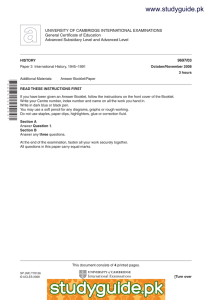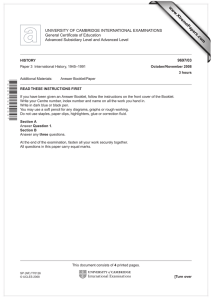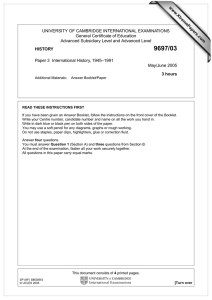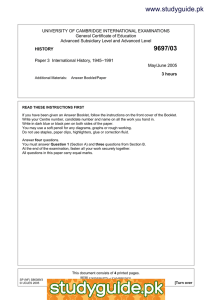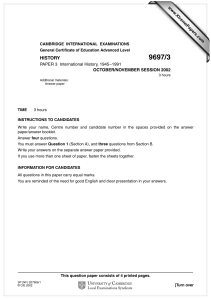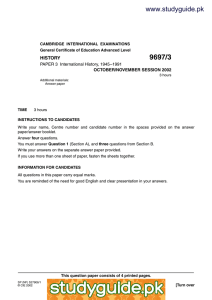www.XtremePapers.com
advertisement
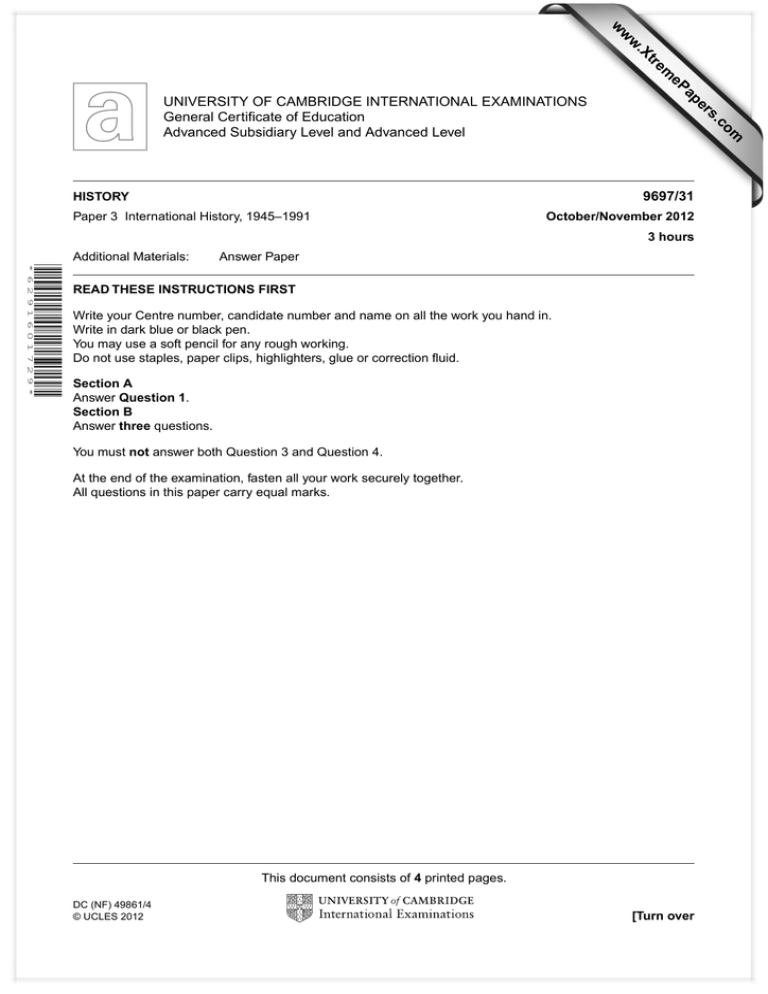
w w ap eP m e tr .X w om .c s er UNIVERSITY OF CAMBRIDGE INTERNATIONAL EXAMINATIONS General Certificate of Education Advanced Subsidiary Level and Advanced Level 9697/31 HISTORY Paper 3 International History, 1945–1991 October/November 2012 3 hours Additional Materials: Answer Paper * 6 2 9 1 6 0 1 7 2 9 * READ THESE INSTRUCTIONS FIRST Write your Centre number, candidate number and name on all the work you hand in. Write in dark blue or black pen. You may use a soft pencil for any rough working. Do not use staples, paper clips, highlighters, glue or correction fluid. Section A Answer Question 1. Section B Answer three questions. You must not answer both Question 3 and Question 4. At the end of the examination, fasten all your work securely together. All questions in this paper carry equal marks. This document consists of 4 printed pages. DC (NF) 49861/4 © UCLES 2012 [Turn over 2 Section A: The Development of the United Nations, 1945–1991 You must answer Question 1. DAG HAMMARSKJOLD AS UN SECRETARY-GENERAL, 1953–1961 1 Read the Sources and then answer the question. When answering Question 1, candidates are advised to pay particular attention to the interpretation and evaluation of the Sources both individually and as a group. Source A Mr Hammarskjold has always been prejudiced against the socialist countries and has always upheld the interests of the USA and other capitalist countries. The events in the Congo, where he has played a simply deplorable role, were merely the last drop which filled the cup of our patience to overflowing. Do not be deluded by the high-flown words used here by Mr Hammarskjold and the representatives of the colonial powers in an attempt to justify the bloody crimes committed against the Congo by the colonialists. We do not, and cannot, place confidence in Mr Hammarskjold. If he himself cannot muster the courage to resign in a chivalrous way, we shall draw the inevitable conclusions. There is no room for a man who has violated the elementary principles of justice in such an important post as that of Secretary-General. Soviet Premier Nikita Khrushchev addressing the UN General Assembly, October 1960. Source B Time and again, Hammarskjold fought in defence of his policy that no vested interests representing any of the power blocs must be allowed to exert their influence. Is it then surprising that he was the object of attack, at times from the West but more often and most violently from the Soviet Union, whose charges took the form of an assault on the very idea of the UN? But he did not live long enough to pursue his policy to its conclusion. He perished on his way to a meeting which he hoped would bring an end to fighting in the Congo. Then – and not until then – criticism of Hammarskjold and UN policy was silenced. Hammarskjold never departed from the path he had chosen – the path that was to result in the UN developing into an effective and constructive international organisation. The Nobel Committee has today awarded him the Peace Prize for 1961 in gratitude for all he did, for what he achieved, for what he fought for – to create peace and goodwill. Presentation Speech by the Chairman of the Nobel Prize Committee, 1961. © UCLES 2012 9697/31/O/N/12 3 Source C Hammarskjold is now sometimes recalled as a sort of superman before whom governments trembled and world problems magically dissolved. In fact he faced insoluble problems as much as his successors. His last year was darkened by a complete break in relations with the USSR and France, a crippling impediment for a Secretary-General, who must be able to deal constructively with member governments and especially with the permanent members of the Security Council. The Congo crisis, which was at its height when he met his death in September 1961, had already given rise to a fundamental constitutional crisis in the UN. It fell to Hammarskjold’s successor to find a way out of these difficulties. It is widely believed that Hammarskjold was admired and enthusiastically supported throughout by the majority of member governments, and especially by Western countries. This is a considerable distortion of the truth. His single-minded internationalism and integrity were not particularly popular with Western governments, except rather grudgingly when he was resolving problems in which they had trapped themselves – the 1956 Suez crisis or Lebanon in 1958, for example. Often they found him too high-minded for their taste. From an article by Sir Brian Urquhart (Former UN Under-Secretary General for Dag Hammarskjold), 1981. Source D Hammarskjold established the UN as we know it. He drew up regulations defining the Secretariat’s responsibilities, affirming its independence from narrowly conceived national interests. He approached international crises through what he liked to call ‘preventive diplomacy’ and sought to establish more independence and effectiveness in the post of Secretary-General itself. Out of this came procedures and tactics new to the UN – the employment of a UN ‘presence’ in world trouble spots and a steadily growing tendency to make the Secretary-General the executive for operations for peace. So totally accepted are these aspects of the UN today that we tend to forget their revolutionary character when Hammarskjold introduced them. In the space of seven years, he had changed the international political landscape and made the UN the indispensable actor in global conflict resolution. He died in the quest for peace, leaving a legacy that remains an inspiration. From an article entitled ‘In Memoriam: Dag Hammarskjold’, by an Egyptian academic, 2005. Source E The United Nations, of which Dag Hammarskjold became Secretary-General in 1953, had already had to establish itself in a world very different from the one imagined by those who drafted its Charter. The start of the Cold War destroyed the collective security concept on which the Security Council was based. Security Council action was blocked by the great power veto. The second big change was decolonization, which turned vacated empires into the fluid battlelines of the Cold War and increased the membership of non-aligned states. It was Hammarskjold’s genius to frame a philosophy and course of action for the UN which fitted the changed context and brought into prominence the political role of the Secretary-General. This brought him into conflict not just with the Soviet Union but with the USA and France. From an article by a British historian, 2005. Now answer the following question. ‘As Secretary-General, Dag Hammarskjold greatly enhanced the prestige and effectiveness of the United Nations.’ How far do Sources A–E support this view? © UCLES 2012 9697/31/O/N/12 [Turn over 4 Section B You must answer three questions from this section. You must not answer both Question 3 and Question 4. 2 ‘The USSR did not seek a breakdown in relations with the USA from 1945 to 1949.’ How far do you agree? 3 To what extent, in the period from 1950 to 1980, did the superpowers globalise the Cold War by deliberately exploiting regional conflicts? OR 4 ‘American foreign policy proved highly successful in the Korean War.’ How far do you agree? 5 To what extent was the crisis of Chinese communism in the late 1980s a consequence of Deng Xiaoping’s determination to reform too much? 6 Consider the view that the Nuclear Non-Proliferation Treaty of 1968 achieved nothing substantial. 7 ‘Japan’s economic miracle was entirely dependent on favourable external factors.’ How far do you agree? 8 Analyse the developing significance of OPEC from 1960 to 1991. Copyright Acknowledgements: Question 1 Source C Question 1 Source E © Brian Urquhart; International Peace and Security, Thoughts on the Twentieth Anniversary of Dag Hammarskjöld’s Death ; Reprinted by permission of FOREIGN AFFAIRS, 1981, by the Council on Foreign Relations, Inc; www.foreignaffairs.com/articles/35505/brian-urquhart/international-peace-and-security-thoughts-on-the-twentieth-anniv. © S Ask, A Mark-Jungkvist; The Adventures of Peace: Dag Hammarskjold’s Assumptions and the Future of the UN ; Palgrave Macmillan; 2005. Permission to reproduce items where third-party owned material protected by copyright is included has been sought and cleared where possible. Every reasonable effort has been made by the publisher (UCLES) to trace copyright holders, but if any items requiring clearance have unwittingly been included, the publisher will be pleased to make amends at the earliest possible opportunity. University of Cambridge International Examinations is part of the Cambridge Assessment Group. Cambridge Assessment is the brand name of University of Cambridge Local Examinations Syndicate (UCLES), which is itself a department of the University of Cambridge. © UCLES 2012 9697/31/O/N/12

